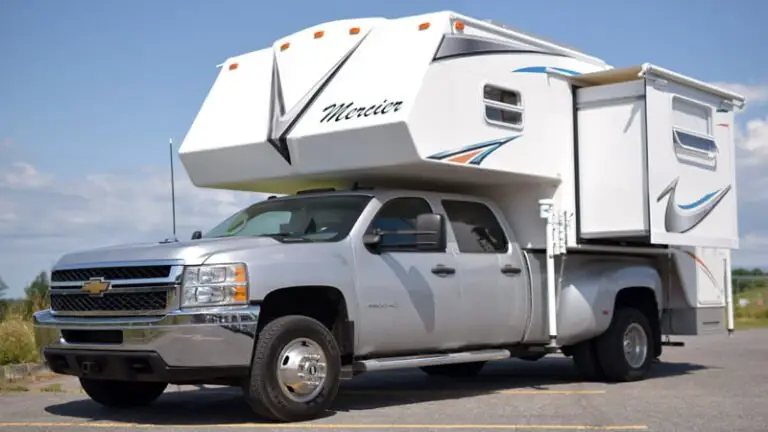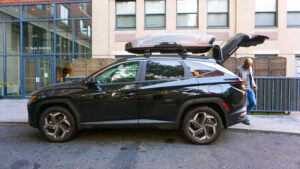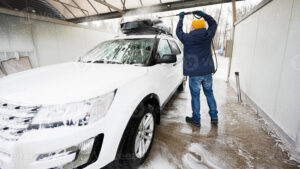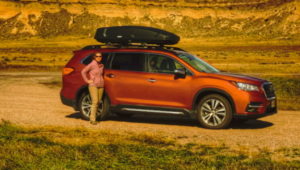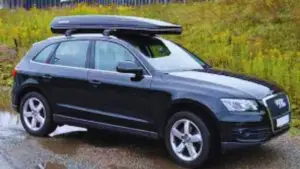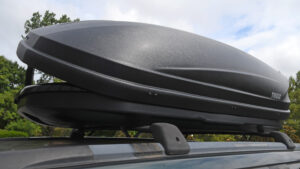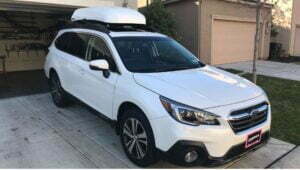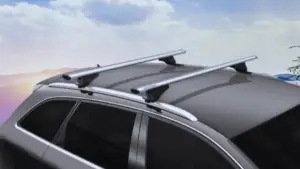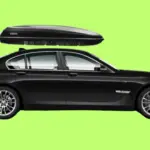Camper enthusiasts often wonder, “Can a camper tip over when parked?” It’s a valid concern, as the stability of a parked camper is crucial for safety and peace of mind. In this article, we’ll explore the factors that can influence the stability of a parked camper and address common questions related to camper tipping. So let’s dive in and uncover the truth about the stability of parked campers!
Table of Contents
ToggleUnderstanding the Stability of Campers
Campers, also known as recreational vehicles (RVs), are designed to provide a comfortable and mobile living space while on the road. While they are generally stable when parked, various factors can influence their stability. Understanding these factors will help you take appropriate measures to prevent tipping accidents.
Factors Affecting Camper Stability
When it comes to the stability of a parked camper, several factors come into play. Let’s take a closer look at each one:
Weight Distribution
Proper weight distribution is vital for maintaining stability when a camper is parked. Uneven weight distribution can cause the camper to become imbalanced, leading to a higher risk of tipping. It’s important to ensure that heavy items are properly secured and evenly distributed within the camper.
Center of Gravity
The center of gravity plays a significant role in determining the stability of a camper. A lower center of gravity provides better stability, while a higher center of gravity increases the risk of tipping. Camper manufacturers design their vehicles to have a low center of gravity, but it’s crucial to be mindful of any modifications that may affect this balance.
Wind Conditions
Strong winds can exert a significant force on a parked camper, increasing the chances of tipping. It’s important to be aware of the weather conditions before setting up camp. If you anticipate high winds, it’s advisable to position the camper in a sheltered area or utilize additional stabilization methods, such as using stabilizer jacks or wind-resistant awnings.
Surface Conditions
The surface on which a camper is parked can also impact its stability. Uneven or sloped terrain can make a camper more prone to tipping. To mitigate this risk, campers should be parked on level ground whenever possible. If leveling is necessary, leveling blocks or stabilizing jacks can be used to create a stable foundation.
Stabilization Systems
Many campers come equipped with stabilization systems that enhance their stability when parked. These systems, such as stabilizer jacks and leveling systems, help distribute weight evenly and minimize movement. Utilizing these features can significantly reduce the risk of a camper tipping over when parked.

Tips to Prevent Camper Tipping
To ensure the stability of your camper when parked, consider the following tips:
- Proper Weight Distribution: Distribute the weight evenly inside the camper, keeping heavier items closer to the center and securing them properly. Consult your camper’s manual for specific weight distribution guidelines.
- Leveling the Camper: Use leveling blocks or jacks to achieve a level position when parking. This reduces the risk of tipping and provides a more comfortable camping experience.
- Stabilizing Techniques: Utilize stabilizer jacks or stabilizing systems to enhance the stability of your camper. These devices minimize movement and sway, improving overall safety.
Importance of Regular Maintenance
Regular maintenance plays a vital role in ensuring the stability of your camper. Consider the following maintenance tasks:
- Inspecting Tires and Suspension: Regularly check your camper’s tires for signs of wear or damage. Ensure they are properly inflated and aligned. Additionally, inspect the suspension system for any issues that could affect stability.
- Checking the Hitch and Coupler: The hitch and coupler are critical components that connect your camper to the towing vehicle. Inspect them regularly for wear, damage, or improper installation. A secure connection is essential for stability.
Common Myths about Camper Stability
Let’s address some common misconceptions surrounding camper stability:
- Myth 1: Campers Never Tip Over: While campers are generally stable, tipping incidents can occur due to various factors. It’s important to understand the risks and take necessary precautions.
- Myth 2: Only Large Campers are Prone to Tipping: Camper stability is not solely determined by size. Factors such as weight distribution, wind conditions, and uneven ground can affect stability regardless of the camper’s size.
5 Most Common Causes of RV Accidents
Recreational vehicles (RVs) are an excellent way to travel and explore the great outdoors. However, they can be susceptible to accidents, particularly in high winds. In this post, we’ll discuss the 5 most common causes of RV accidents, focusing on wind-related incidents and how to avoid them.
1. Insufficient Stability and High Winds
RVs, 5th wheels, and travel trailers can become unstable in high winds, making them more likely to tip over when parked or even while driving. Wind speeds as low as 10 miles per hour can be enough to cause a camper to tip. RVs can withstand winds up to 75 mph while stationary, but this will depend largely on the type of RV and whether it is moving or stationary.
When parking an RV in windy conditions, consider factors like the surface area, center of gravity, and side of the vehicle. Be sure to use stabilizers and retract slide-outs to minimize wind hitting the broadside of the RV.
2. Parking in Unsafe Locations
When choosing a campground or parking area, it’s crucial to avoid locations that could put your RV at risk. Strong winds can cause damage from falling tree limbs or even flip RVs in extreme cases. Park next to a building or other structures that can act as a wind-breaker, reducing the wind speed and force hitting your RV.
3. Towing and Wind Gusts
Towing a travel trailer or fifth-wheel can be challenging in high winds, as gusts can cause trailer sway and make it difficult to control the tow vehicle. High winds can flip RVs traveling at highway speeds, so it’s essential to monitor wind conditions and avoid driving in severe winds. Using stabilizer bars and practicing proper towing techniques can help minimize sway and maintain control in windy conditions.
4. Insufficient Weight Distribution
Proper weight distribution is crucial for maintaining stability in an RV, both when parked and while driving. An unevenly loaded camper can have a higher risk of tipping in high winds. Distribute weight evenly inside the RV, placing heavier items low to the ground and close to the center of gravity.
5. Lack of Proper Maintenance
Regular maintenance is necessary to ensure your RV remains safe and stable in various weather conditions, including high winds. Inspect your RV’s stabilizers, brakes, tires, and suspension components regularly to ensure they are in good working order.
Understanding the impact of wind on your RV and taking the necessary precautions can help prevent accidents and keep you safe during your travels. By staying informed of weather conditions, parking in protected areas, securing your RV, and practicing proper towing techniques, you can minimize the risk of wind-related accidents and enjoy a safe and enjoyable RV experience.

FAQs about Camper Stability
Now, let’s address some frequently asked questions related to camper stability:
Q: Can a camper tip over if it’s properly leveled?
No, if a camper is properly leveled, the risk of tipping is significantly reduced. Leveling ensures an even weight distribution and helps maintain the camper’s stability, both when stationary and in use.
Q: Can a camper tip over in strong winds?
While it’s possible for a camper to tip over in strong winds, it is less likely if proper precautions are taken. Positioning the camper in a sheltered area, using stabilizer jacks, and lowering awnings can all help mitigate the risk of tipping in windy conditions.
Q: Can adding modifications to a camper affect its stability?
Yes, adding modifications to a camper can potentially impact its stability. Any modifications that raise the center of gravity or alter weight distribution should be done with caution and under the guidance of a professional to ensure the camper remains stable.
Q: Are there additional measures I can take to enhance camper stability?
Absolutely! In addition to the factors mentioned earlier, you can take extra measures to enhance camper stability. Using chocks to prevent rolling, employing stabilizing bars, and properly securing heavy items within the camper are all effective ways to improve stability.
Q: Can a camper tip over on uneven terrain?
Yes, a camper can be more susceptible to tipping on uneven terrain. It’s important to level the camper as best as possible using leveling blocks or stabilizing jacks to minimize the risk of tipping.
Q: Can the size and type of camper affect its stability?
Yes, the size and type of camper can influence stability. Generally, larger campers tend to have a higher center of gravity, making them more prone to tipping. However, manufacturers design campers with stability in mind, regardless of size, and implementing proper leveling and stabilization techniques can mitigate these risks.
Q: Should I be concerned about parking my camper on a slope?
Parking on a slope increases the risk of tipping. It’s advisable to level your camper using blocks or jacks to achieve a stable position.
Q: How often should I inspect my camper’s tires and suspension?
Regularly inspect your camper’s tires before each trip and check the suspension system at least once a year or as recommended by the manufacturer.
Q: Can I use any type of leveling blocks for my camper?
It’s best to use leveling blocks specifically designed for campers. These blocks are sturdy, reliable, and provide better stability.
Q: Is camper tipping covered by insurance?
Insurance coverage varies, so it’s important to review your policy. Some policies may cover accidents or damage related to camper tipping, but specific details should be discussed with your insurance provider.
Can a Camper Tip Over When Parked? Final Thoughts
Yes, while the stability of a parked camper depends on various factors such as weight distribution, center of gravity, wind conditions, surface conditions, and the use of stabilization systems, it is possible to minimize the risk of tipping by taking appropriate precautions. By understanding these factors and following best practices for leveling, stabilizing, and securing your camper, you can enjoy a safe and worry-free camping experience.
Remember, prioritizing safety should always be the first step when setting up your camper. So go ahead, explore the great outdoors, and embark on unforgettable adventures, knowing that you’ve taken the necessary steps to prevent your camper from tipping over when parked.
